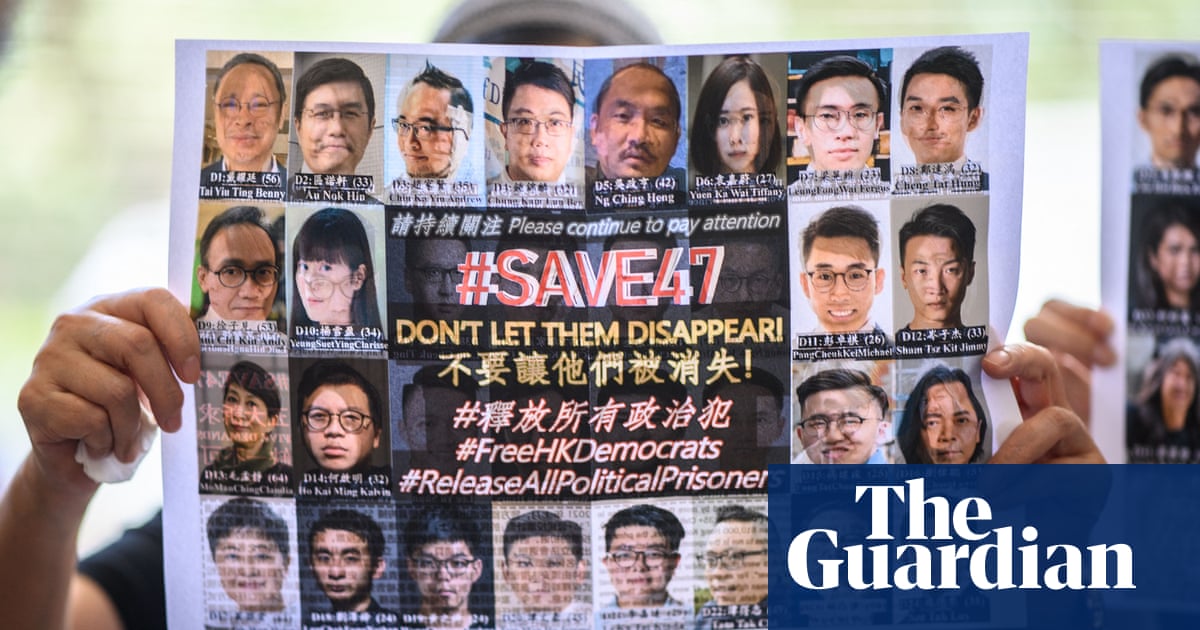Dozens of Hong Kong’s most prominent pro-democracy figures have been jailed – one for 10 years – in the territory’s largest national security trial, following a prosecution that has been widely criticised as politically motivated.
The jailed are among 47 people, known as the “Hong Kong 47”, who were charged in 2021 under the punitive national security law (NSL) with conspiracy to commit subversion over their involvement in pre-election primaries held in 2020 ahead of the Hong Kong general election.
The group are some of the most public faces of the resistance to a Beijing-led crackdown on dissent and political freedom in Hong Kong. They were activists, legislators, campaigners and councillors from the pro-democracy camp of Hong Kong’s previously vibrant political scene.
A spokesperson for the US consulate in Hong Kong said the US “strongly condemns” the sentencing, adding the defendants were “aggressively prosecuted and jailed for peacefully participating in normal political activity”.
Benny Tai, a legal academic and activist who pleaded guilty, was sentenced to 10 years in jail on Tuesday for his role as an organiser of the primaries. Tai’s is the longest sentence handed out so far under the NSL, which was passed in mid-2020.
Tai was accused of being the “mastermind” behind a plan for the city’s pro-democracy camp to win a majority in the city’s general election, and then block bills and eventually force the dissolution of the legislature and resignation of the chief executive.
The three government-picked judges overseeing the case ruled that this plan was a violation of Hong Kong’s mini-constitution, the Basic Law, and an act of conspiracy to commit subversion under the NSL.
Joshua Wong, one of the most public faces of the 2019 protest movement, was sentenced to four years and eight months after being given a one-third reduction for pleading guilty. The court said he was an “active participant” in the primaries plan.
The judgment also determined he was “not of good character” because of his previous convictions. Wong is already in jail serving sentences for other protest-related charges, but the judges said the additional sentence “would not have a crushing effect on him”.
Australian-Hong Kong dual national Gordon Ng was sentenced to more than seven years. Ng was among 16 of the 47 defendants to plead not guilty but was convicted in May.
After the sentencing, Australia’s foreign minister, Penny Wong, said her government was “gravely concerned” about Ng’s sentence, and had expressed its “strong objections to the Chinese and Hong Kong authorities on the continuing broad application of national security legislation”.
Of the 47, 31 had pleaded guilty, and two were acquitted at trial. Most have spent more than three years in jail already, but none were released on Tuesday. Those who pleaded not guilty were given harsher sentences.
Former Stand News journalist Gwyneth Ho was sentenced to seven years in jail. Ho, who had intended to run in the elections as a candidate, had pleaded not guilty.
Claudia Mo, a 67-year-old popular former legislator who pleaded guilty, received one of the shortest sentences – four years and two months. The judges took into account her public service but said she was still an “active participant”.
There has been intense public interest in the trial in Hong Kong and the queue for members of the public to get inside the West Kowloon magistrates court started over the weekend and numbered several hundred people by Tuesday. Some who had been in the line for a day or more were accused by bystanders of being paid to queue and take a seat ticket but not go into court – a practice that has come under increasing public scrutiny for political cases.
On Tuesday morning, vanloads of police patrolled and ushered the crowd into a line that stretched down the block and folded back on itself. Officers were seen searching several people.
The case is the largest by number of defendants since the NSL was passed. The 47 were arrested in early 2021 in a series of dawn raids on homes and offices that shocked the city.
Western governments, human rights organisations and legal groups have criticised the prosecution since its beginning, characterising it as a politically motivated attack on the pro-democracy opposition.
China and Hong Kong say the security law restored order after the 2019 protests and have warned against “interference” from other countries.
Dennis, a former district councillor, lined up at 4am to support the convicted, many of them his friends. Dennis has been able to visit some of his friends in jail over the years.
“I think quite a number of them are quite depressed about their future. So I think I have to come and give a little support.”
Further towards the front of the queue, Jerome Lau, 74, said he had visited many of his jailed friends in Stanley prison. “Just for me to wake up early on a rainy day, compared to what they’re suffering inside the prison, it’s nothing at all.”
On Wednesday, the jailed media tycoon and pro-democracy activist Jimmy Lai will also testify in his collusion trial, breaking the silence he has kept over five previous trials and almost four years in jail.
The charges against Lai – the founder of the now-closed popular Chinese-language tabloid Apple Daily – revolve around the newspaper’s articles, which supported the pro-democracy protests and criticised Beijing’s leadership. Lai has pleaded not guilty.
With Agence France-Presse

